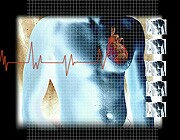Findings for patients with heart failure with reduced ejection fraction, predominantly central sleep apnea
TUESDAY, Sept. 1, 2015 (HealthDay News) — For patients with heart failure with reduced ejection fraction and predominantly central sleep apnea, adaptive servo-ventilation does not improve outcome, according to a study published online Sept. 1 in the New England Journal of Medicine to coincide with the annual European Society of Cardiology Congress, held from Aug. 29 to Sept. 2 in London.
Martin R. Cowie, M.D., from Imperial College London, and colleagues examined the impact of adaptive servo-ventilation in a trial involving 1,325 patients with a left ventricular ejection fraction of 45 percent or less, apnea-hypopnea index (AHI) of 15 or more events per hour, and a predominance of central events. Patients were randomized to receive guideline-based medical treatment with adaptive servo-ventilation or guideline-based medical treatment alone.
The researchers found that at 12 months, the mean AHI was 6.6 events per hour in the adaptive servo-ventilation group. There was no significant between-group difference in the incidence of the primary end point (54.1 percent in the adaptive servo-ventilation group and 50.8 percent in the control group; hazard ratio, 1.13; 95 percent confidence interval, 0.97 to 1.13; P = 0.10). The adaptive servo-ventilation group had significantly higher all-cause mortality and cardiovascular mortality than the control group.
“We found that in patients who had heart failure with a reduced ejection fraction and predominantly central sleep apnea, the addition of adaptive servo-ventilation to guideline-based medical treatment did not improve the outcome,” the authors write.
Several authors disclosed financial ties to pharmaceutical and medical device companies, including ResMed, which funded the study.
Copyright © 2015 HealthDay. All rights reserved.








